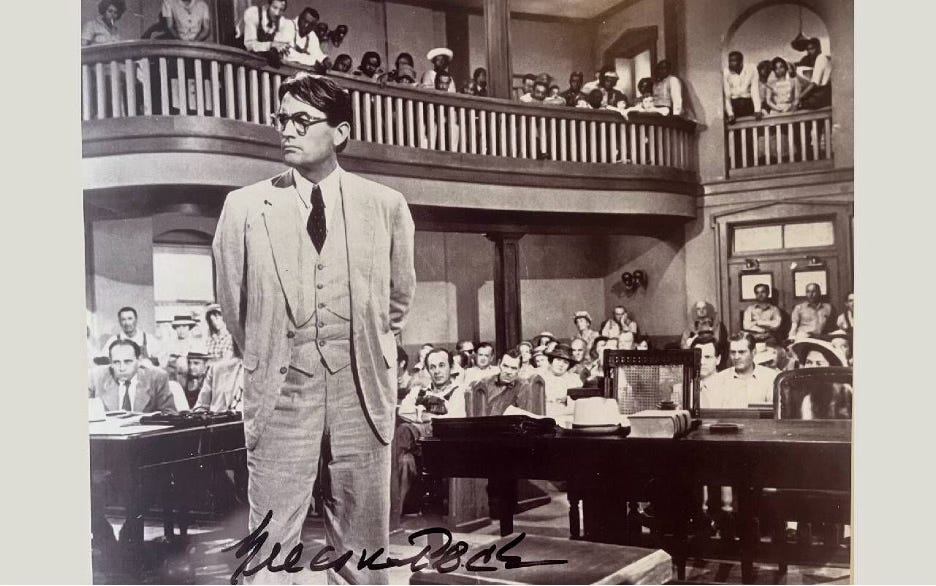Atticus Finch is one of the most beloved and romanticized characters in American literature. Thus, it is no wonder that those who read To Kill a Mockingbird in high school were appalled when, in Harper Lee’s posthumously published Go Set a Watchman, the hero showed his southern sensibilities, including his “prejudices.” To appreciate one of the great heroes of American literature, we must understand what “Atticus” stands for.
“What’s in a name?” Shakespeare once asked. Great literary authors often use names to signal essential aspects of a character’s nature. Lee admitted that she modeled Atticus Finch after her father, whom she described as a man of “genuine humility and a natural dignity.” But Lee’s father was not named “Atticus.”
The name “Atticus” means “of Attica,” the region of Greece that cradled Athens. Many Romans were named Atticus both when Rome was founded and when Rome fell. The name “Atticus” originally signaled that the Roman was not of Rome but cut from the Athenian cloth. Latin surnames function as adjectives indicating one’s lineage.
Atticus Finch is southern but cut from a different cloth. He does not blindly follow southern ways; rather, his conscience leads him. Therefore, he has moral integrity, which lends him a natural dignity. Furthermore, he has the prudence to remain humble even while defying the southern sensibilities he understands to be wrong. The height of his moral character—his prudence in navigating the immoralities of his society and his adherence to truth and justice—is on full display in his closing argument in the courtroom scene (I will leave this essay spoiler-free.)
Nevertheless, we can examine his defiance of southern tradition on behalf of justice in various scenes throughout the novel. Chapter 13 of the novel best exemplifies this. When Aunt Alexandra comes to town and begins asserting her influence upon the family, Atticus slowly begins to take his stand.
The chapter opens with Alexandra ordering Calpurnia, the black woman hired to raise the children, to “Put my bag in the front room.” When Alexandra eventually tells Atticus to fire her, Atticus responds that “She’s a faithful member of this family.” He describes Cal as motherly, “bring[ing the children] up according to her lights, and Cal’s lights are pretty good—and another thing, the children love her.”
Why does Alexandra wish to have Cal fired? In Chapter 13, Alexandra declares to Scout, “We [meaning ME] decided that it would be best for you to have some feminine influence.” Alexandra wants to provide that influence. Scout doesn’t see the problem: “Cal’s a girl.” Scout doesn’t see color. She doesn’t blindly follow those who assert their right to rule or raise her due to a simple familial connection.
Alexandra wants to rule, and she thinks she has a right to rule the family because it is hers: “Aunty had a way of declaring What Is Best For The Family.” For Scout, however, the right to rule is not a matter of inheritance, but of merit.
Aunt Alexandra refuses to make judgments on the basis of character, and she discriminates not only on the basis of color but on the basis of kinship. Her morality does not come from her conscience, as Atticus’s does; rather, it comes from her surroundings: “let any moral come along and she would uphold it.” Yet Alexandra sees her morality as objective: “she was born in the objective case.”
These two pithy descriptions tell us all we need to know about the impassable expanse between Atticus and his sister. Atticus is humble: he is open to questioning “any moral [that] come[s] along.” He is truly objective, and his objectivity comes from the pursuit of truth. Yet, he is humble in the pursuit of truth.
Atticus is Athenian in the Socratic sense: he knows that there are some things that he does not know, and this puts him on the path of wisdom and prepares him to pursue justice: first personally, then filially, and finally politically.
Those who fell out of love with Atticus after reading the first draft of To Kill a Mockingbird (foolishly published as a separate novel Go Set a Watchman) fall prey to the same prejudice as Aunt Alexandra, the petty tyrant of To Kill a Mockingbird. They give up on Atticus because they refuse to humble themselves in attempting to understand what it means to create a great character who is morally conflicted but strives to pursue justice nevertheless.
To truly love, admire, and revere Atticus, we must learn from him. We must learn to be objective in the correct sense. To learn from Atticus and To Kill a Mockingbird is to learn discernment in the face of our own societal prejudices.


